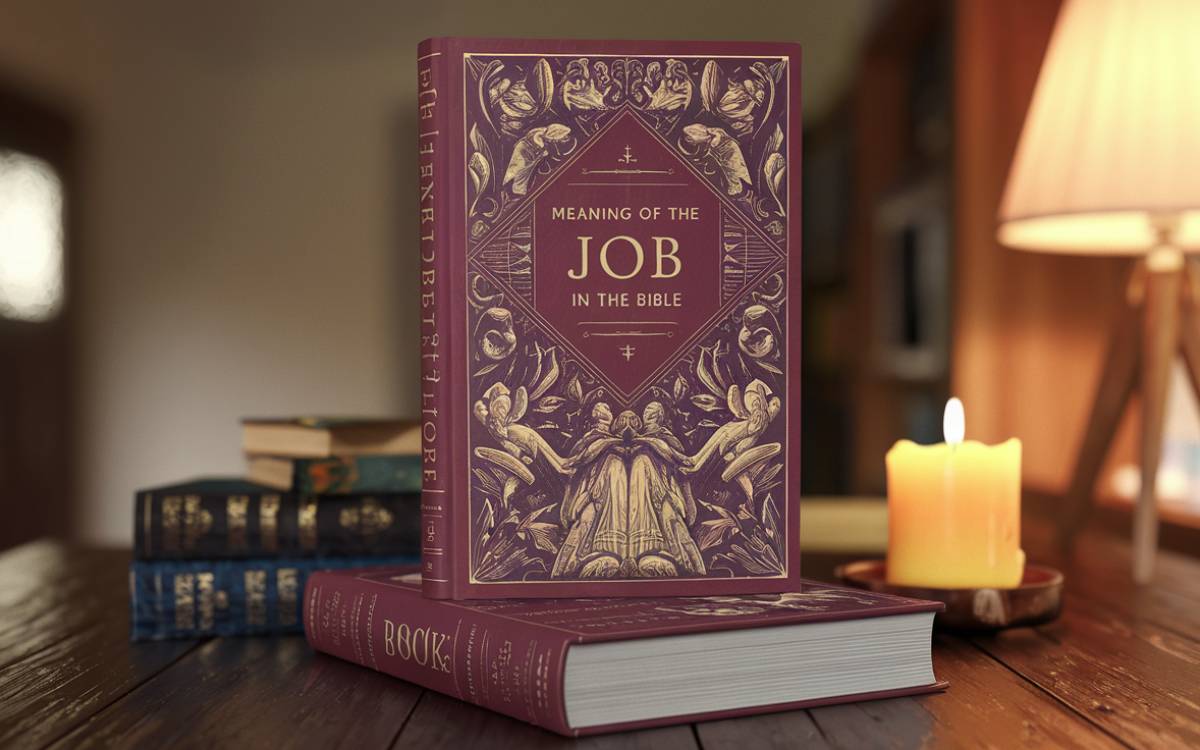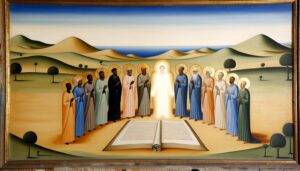Meaning of the Book of Job in the Bible: Suffering and Faith
The Book of Job in the Bible grapples with profound themes of suffering, divine justice, and human limitations in understanding God’s will. Job’s suffering, despite his continued righteousness, challenges the retributive justice paradigm prevalent in ancient Near Eastern thought.
His dialogues with friends and God’s ultimate response emphasize the inscrutability of divine wisdom and the inadequacy of human perception to fully comprehend it. Symbolism in the narrative, such as Leviathan and Behemoth, further illustrates God’s omnipotence.
For those exploring these themes in depth, the narrative offers a rich tapestry of theological reflection and existential inquiry.

Meaning of the Book of Job in the Bible: Suffering, Faith, and God’s Sovereignty
| Aspect | Details |
|---|---|
| Book Overview | A poetic and philosophical exploration of suffering, faith, and the justice of God. Chronicles Job’s trials and eventual restoration. |
| Key Themes | The mystery of suffering, God’s sovereignty, human faith, and the limits of human understanding. |
| Main Characters | Job (righteous sufferer), Satan (accuser), Job’s friends (Eliphaz, Bildad, Zophar, Elihu), and God. |
| Key Events | Job’s immense suffering caused by Satan, the dialogues with his friends, God’s response from the whirlwind, and Job’s restoration. |
| Symbolism | Job’s Trials: Human resilience and testing of faith; Whirlwind: God’s overwhelming power and wisdom; Restoration: God’s justice and faithfulness. |
| Historical Context | Believed to be one of the oldest books in the Bible, written between 2000–1500 BCE, with no definitive author identified. |
| Purpose of the Book | To address the problem of suffering, affirm the sovereignty and wisdom of God, and highlight the value of unwavering faith in adversity. |
| Lessons for Today | Teaches trust in God during trials, the importance of humility, and faith in God’s greater plan despite suffering. |
Historical Context

To understand the meaning of the Book of Job, it is essential to first examine its historical context, which situates the text within ancient Near Eastern literature and culture.
The Book of Job is often considered a wisdom text, sharing thematic and literary parallels with other ancient documents such as the Babylonian ‘Ludlul-Bel-Nemeqi’ and the Sumerian ‘Man and His God.’ These works similarly grapple with themes of suffering and divine justice.
Job’s narrative can therefore be seen as part of a broader tradition that questions the relationship between human suffering and divine will.
In addition, its linguistic and stylistic elements suggest a composition period during the early post-exilic era, reflecting theological concerns pertinent to that epoch.
This context enriches our understanding of its theological implications.
Plot Overview

Building on this historical context, the plot of the Book of Job unfolds through a complex narrative structure that addresses profound questions of human suffering, divine justice, and faith.
The story begins with a heavenly council where Satan challenges Job’s righteousness, leading to Job’s immense suffering through loss and affliction.
Job’s friends arrive, offering traditional explanations that attribute his suffering to sin.
Job, however, maintains his innocence and questions divine justice.
The climax occurs when God responds, emphasizing the limitations of human understanding.
- Heavenly council: Satan’s challenge initiates Job’s trials.
- Job’s suffering: Loss of wealth, family, and health.
- Friends’ counsel: Traditional views on suffering and sin.
This intricate plot invites theological reflection on divine-human dynamics.
Themes of Suffering

The Book of Job intricately explores the multifaceted nature of human suffering, challenging simplistic interpretations and prompting profound theological inquiry.
Job’s inexplicable afflictions—loss of wealth, family, and health—serve as a crucible for examining the existential dimensions of pain. The narrative dismantles the retributive justice paradigm, suggesting that suffering is not always a consequence of sin.
Job’s lamentations and dialogues with his friends elucidate the emotional and spiritual turmoil inherent in suffering. His relentless quest for understanding underscores the human desire for divine communication amidst anguish.
Through poetic discourses and divine encounters, the text investigates the complexity of suffering, emphasizing its inscrutability and the limitations of human wisdom in comprehending divine purposes.
Divine Justice

The Book of Job presents a profound exploration of divine justice, raising critical questions about the relationship between suffering and innocence.
God’s omnipotence is portrayed as an overarching principle that transcends human understanding, thereby highlighting the limitations inherent in human perspectives.
Through Job’s experiences, the text prompts a theological reflection on the nature of divine justice and the appropriate human response to God’s inscrutable will. Job’s trials lead to profound questions about suffering, the role of faith, and the limits of human understanding in the face of God’s decisions. This paradox resonates with the biblical instruction, “slaves obey your masters meaning,” highlighting the complexities of submission and obedience in the context of divine authority and earthly reality. Ultimately, the story encourages believers to grapple with their faith amid adversity, recognizing that divine justice may not always align with human perceptions of fairness.
Suffering and Innocence
Within the narrative of the Book of Job, the relationship between suffering and innocence serves as a profound exploration of divine justice. Job, a paragon of virtue, faces immense suffering despite his righteousness, challenging the retributive justice paradigm. This narrative compels readers to question the simplistic equation of suffering with sin and prosperity with virtue.
Through Job’s ordeal, several critical points emerge:
- The inscrutability of divine will and the limitations of human understanding.
- The inadequacy of conventional wisdom in explaining the complexities of divine justice.
- The role of faith and perseverance amidst inexplicable suffering.
Ultimately, the Book of Job invites a deeper reflection on the nature of divine justice beyond human comprehension.
God’s Omnipotence Explained
God’s omnipotence in the Book of Job underscores the theme that divine justice transcends human understanding and operates according to a wisdom that is beyond mortal comprehension.
This theological assertion is evident when God responds to Job’s questioning by highlighting His creation and governance of the universe (Job 38-41).
The dialogue illustrates that God’s omnipotence encompasses not only His power but also an inscrutable justice.
By invoking cosmic elements and natural phenomena, the text emphasizes that human reasoning is limited and cannot fathom the divine rationale.
The narrative, consequently, serves to affirm that God’s justice, while seemingly enigmatic, is rooted in an all-encompassing divine wisdom that orchestrates the cosmos with sovereign authority.
Human Limitations Acknowledged
Acknowledging human limitations, the Book of Job poignantly illustrates that the finite human mind is incapable of fully grasping the complexities of divine justice. Job’s narrative underscores our inability to comprehend God’s decisions, questioning the assumption that human suffering is always a direct result of sin.
God’s response to Job highlights the vast chasm between divine omniscience and human understanding. This theological perspective serves as a humbling reminder of our limited scope in the grand cosmic order.
- Human wisdom is inherently limited in understanding divine purposes.
- Divine justice transcends human reasoning, often appearing inscrutable.
- Job’s suffering is a test of faith rather than a punishment.
The Book of Job consequently invites readers to accept divine mysteries with humility.
Role of Satan
In the Book of Job, Satan operates as a celestial adversary whose role is to test the righteousness and faith of Job under divine permission. This figure, known as ‘the accuser,’ challenges God’s assertion of Job’s piety by suggesting that his devotion is motivated by material blessings.
Satan’s interactions with God in the heavenly court serve to introduce the central theme of disinterested righteousness—worship and faithfulness to God that do not depend on personal gain. Theologically, Satan’s role underscores the notion of divine sovereignty, as he can only act within the boundaries set by God.
This dynamic invites readers to contemplate the nature of suffering and the complexities of divine justice and human fidelity.
Job’s Friends

Job’s friends initially come to console him, but their misguided counsel quickly reveals their theological misunderstandings.
They accuse Job of hidden sins, assuming his suffering is a direct consequence of divine retribution.
However, God’s eventual rebuke highlights the error in their simplistic theology and underscores the complexity of divine justice.
Misguided Counsel Offered
The dialogues between Job and his friends reveal a series of theological and philosophical missteps, as they offer well-intentioned but ultimately flawed counsel based on their limited understanding of divine justice.
The friends—Eliphaz, Bildad, and Zophar—adhere to a retributive theology that equates suffering with divine punishment for sin. This perspective, while reflecting common ancient Near Eastern beliefs, is inadequate for comprehending Job’s unique situation. Their advice fails to grasp the complexity of God’s purposes and Job’s righteousness.
They make several critical errors:
- Assume moral causality: suffering as a direct result of sin.
- Lack of theological depth: oversimplified views of divine justice.
- Misinterpret suffering: unable to see it as a test or trial.
Job’s Friends’ Accusations
Eliphaz, Bildad, and Zophar levy a series of pointed accusations against Job, challenging not only his integrity but also his understanding of divine justice.
Eliphaz asserts that suffering is invariably the result of sin, implying Job’s hidden transgressions (Job 4:7-8).
Bildad contends that Job’s children must have sinned, meriting their demise (Job 8:4), and insists on repentance as the path to restoration.
Zophar, more brusque, accuses Job of verbosity and deceit (Job 11:2-3), asserting that Job’s punishment is less than deserved.
These friends embody a retributive theology, positing a direct correlation between sin and suffering.
Their accusations reflect a limited perception of divine justice, failing to grasp the nuanced and mysterious ways of God’s governance over human affairs.
Divine Rebuke Given
God’s rebuke of Job’s friends underscores the inadequacy of their theological assumptions and their failure to speak rightly about His nature and actions (Job 42:7). This divine disapproval highlights several critical points:
- Misrepresentation of God: Job’s friends portrayed God as mechanistically retributive, ignoring His grace and justice.
- Faulty Theodicy: They assumed suffering is always a direct result of personal sin, missing the broader context of divine purposes.
- Lack of Compassion: Their rigid theology led to a lack of empathy and support for Job in his suffering.
This correction serves as a theological admonition against simplistic interpretations of divine actions and human suffering.
God’s Response

In a whirlwind, Yahweh addresses Job, providing a profound and humbling discourse on the nature of divine wisdom and human limitations.
Yahweh’s response, encapsulated in Job chapters 38-41, redirects the focus from Job’s suffering to the grandeur and complexity of creation. Through a series of rhetorical questions, God reveals Job’s limited understanding and inability to govern the universe.
The discourse underscores the vast chasm between divine omniscience and human knowledge, asserting that God’s ways are inscrutable and beyond human critique. Theologically, this response emphasizes God’s sovereignty and challenges the retributive justice paradigm, inviting readers to trust in divine wisdom despite existential ambiguities.
This divine monologue consequently reframes suffering within the broader context of God’s unfathomable purpose.
Symbolism and Imagery

Yahweh’s discourse not only demonstrates divine wisdom but also employs rich symbolism and vivid imagery to illustrate the vastness of His creation and power.
Through references to natural wonders and mythical creatures, the text conveys the limitations of human understanding.
Key elements include:
- Leviathan and Behemoth: Symbolizing chaos and God’s supreme control over formidable forces.
- Whirlwind: Representing the divine presence and the mysterious nature of God’s ways.
- Constellations: Highlighting the intricate and ordered cosmos, beyond human grasp.
These symbols and images serve to elevate the discourse from mere dialogue to profound theological reflection, underscoring the transcendence and majesty of the Creator.
Modern Relevance

The enduring themes of suffering, justice, and divine sovereignty in the Book of Job continue to resonate deeply within contemporary theological and philosophical discourse. The narrative’s exploration of human suffering and divine justice prompts modern readers to reflect on existential questions and ethical dilemmas.
| Theme | Modern Relevance |
|---|---|
| Suffering | Raises questions about the purpose and nature of suffering in human life. |
| Justice | Challenges the notion of retributive justice and divine fairness. |
| Sovereignty | Examines the limits of human understanding of God’s will. |
| Faith | Encourages steadfastness in faith amidst adversity. |
| Wisdom | Promotes seeking deeper wisdom beyond surface-level answers. |
Job’s narrative offers a profound framework to grapple with life’s inequities, fostering a nuanced understanding of faith and resilience.
Conclusion
The Book of Job, a profound tapestry of suffering and divine justice, challenges simplistic notions of retribution theology.
Through Job’s trials, dialogues with friends, and God’s enigmatic response, the text explores the depths of human anguish and the inscrutable nature of the divine.
Symbolism and imagery enrich this narrative, offering layers of meaning that resonate through the ages.
Its modern relevance endures, inviting continual reflection on the complexities of faith and the human condition.






